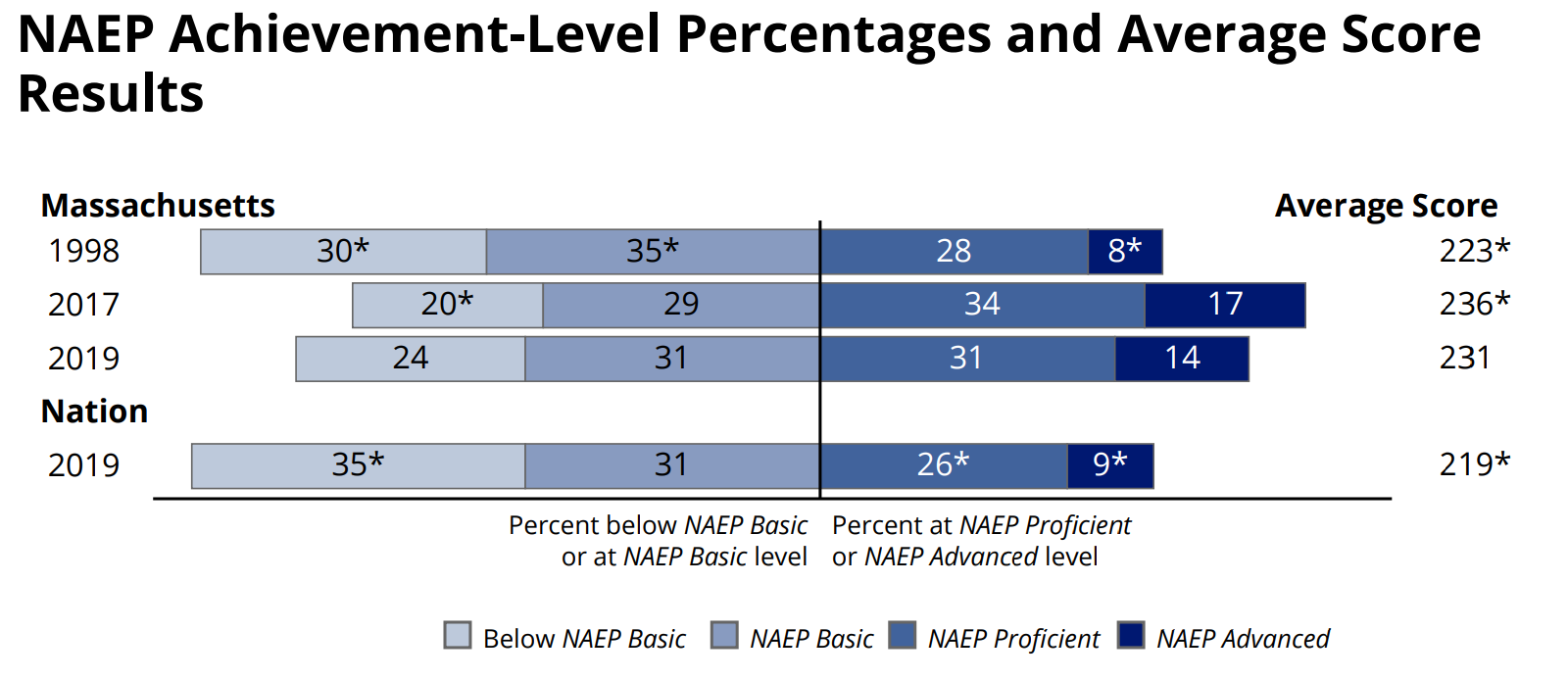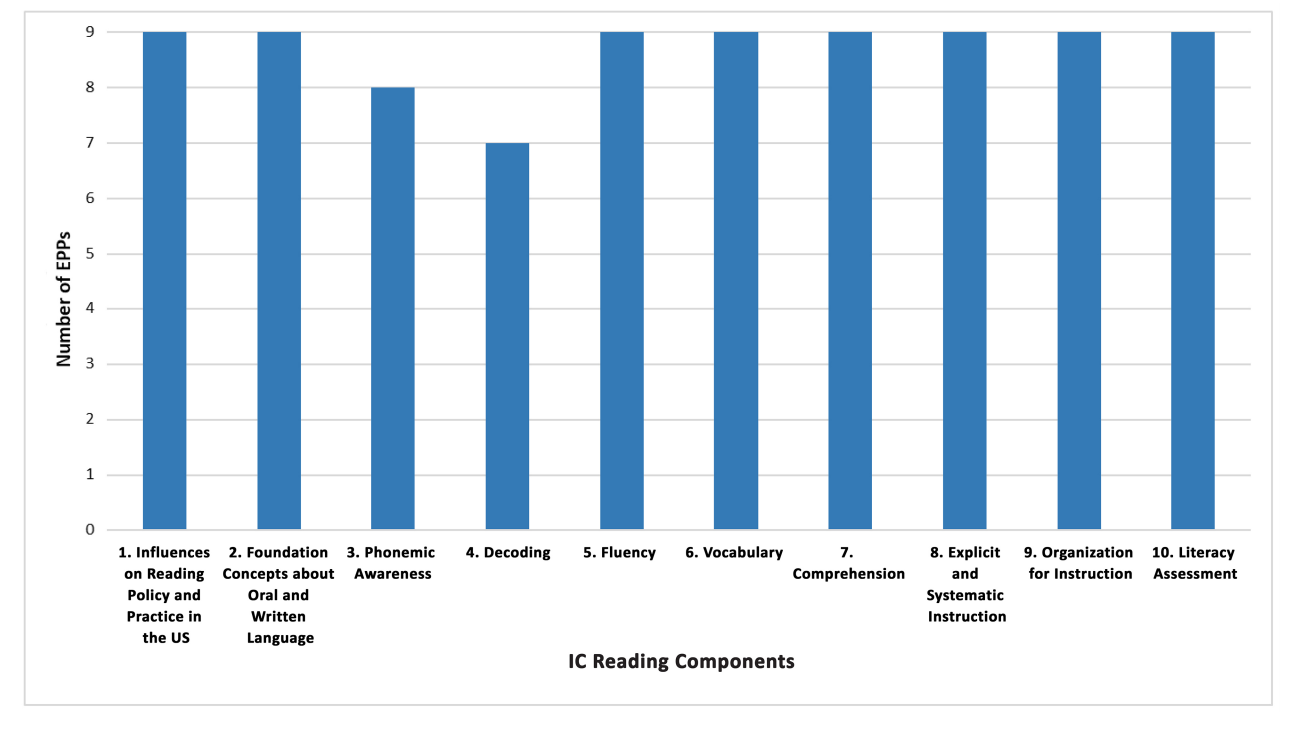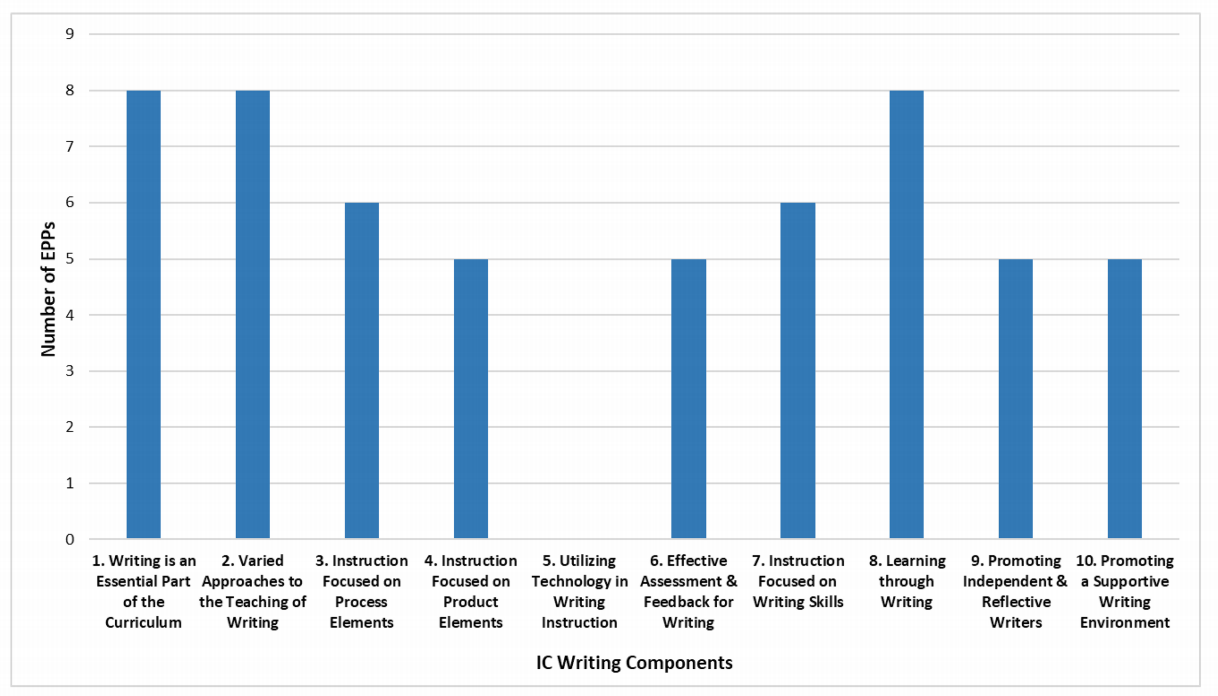Introduction/Background
Readers may be surprised to learn just how many U.S. public school students struggle to read and write. The Nation’s Report Card (2020) reports the majority (66 percent) of 4th-grade students scored below proficient on The 2019 National Assessment of Educational Progress (NAEP) in Reading, a standardized test administered to a representative sample of students every 2 years.
Massachusetts leads on national literacy achievement, but not all students in the state are receiving the instruction and support they need. Only 29% of Black and Latinx 4th graders achieve proficient levels in reading, which is less than half the achievement level of their White peers (The Nation’s Report Card, 2020). To achieve equity, every student must receive high-quality curriculum and evidence-based instruction in their schools and classrooms that are culturally responsive and sustaining. The Massachusetts Department of Elementary and Secondary Education (DESE)’s 2019 Literacy Strategic Plan identifies two areas of focus for instructional support for English language arts (ELA) and literacy: high-quality core instruction and the use of evidence-based practices for early literacy skills.

Source. The Nation’s Report Card, 2020.
To support its Literacy Strategic Plan, DESE requested that the Region 1 Comprehensive Center (R1CC) conduct a statewide needs assessment on educator preparation in K–3 literacy instruction. The needs assessment consisted of a review of early childhood and elementary certification course syllabi (EPP Core Course Review) to understand which programs are preparing and providing preservice teachers with opportunities to learn about and practice evidence-based reading and writing instruction. The EPP Core Course Review findings will inform DESE’s policy and supports needed to achieve its vision of an excellent education in ELA and literacy for all its students.
Methods and Process
The review focused on syllabi of core courses required for individuals pursuing certification in early childhood (prekindergarten–Grade 2) or elementary school (Grades 1–6). Trained reviewers used CEEDAR Center’s Innovation Configurations (ICs) to examine the content in syllabi from a voluntary sample of nine EPPs representing 30% of Massachusetts graduates in early childhood and elementary programs. This review addressed the following two questions:
- To what extent are evidence-based practices in reading and writing instruction represented within program syllabi from the participating EPPs?
- Do syllabi vary in the intensity and levels of practice-based opportunities associated with the evidence-based practices in reading and writing instruction? If so, how do they vary?
The two ICs used in the review include Evidence Based Reading Instruction for Grades K–5 (Lane, 2014) and Evidence-Based Practices for Writing Instruction (Troia, 2014). Following the EPP Core Course Review, R1CC developed a report, Early Literacy in Massachusetts: Part 1. Findings from the Massachusetts Educator Preparation Program Early Childhood and Elementary Education Program Core Course.
Characteristics of the Nine Participating EPPs
| Programs | Number of Course Syllabi Reviewed | |
|---|---|---|
| Program Type | ||
| Baccalaureate | 6 | 44 |
| Postbaccalaureate | 3 | 20 |
| Certification Program | ||
| Early childhood education | 1 | 11 |
| Elementary education | 8 | 53 |
| Public or Private | ||
| Public | 3 | 20 |
| Private | 6 | 44 |
Key Findings
Reading Instruction
While seven of the nine participating EPPs presented all IC components outlined in the reading rubric, decoding and phonemic awareness were absent from syllabi in two programs. Research has shown that instruction in phonemic awareness and decoding is critical for students to learn to read (DESE, 2017; Foorman et al., 2016). IC components were also presented with varying intensity. For example, while syllabi may have mentioned content related to decoding and phonemic awareness, the associated course activities sometimes offered limited opportunities for preservice teachers to apply what they were learning.
Essential Components of the IC Reading Rubric Represented in the EPPs’ Syllabi

Writing Instruction
Only half of the syllabi presented the IC components of writing instruction, and components were covered with varying intensity. These findings align with national research that suggests EPPs may not be preparing teachers to teach essential writing skills as adequately as reading skills. Across the country, teachers have reported feeling less prepared to teach writing and, as a result, report spending less time teaching writing skills than reading skills (Baggott, 2012).
Essential Components of the IC Writing Rubric Represented in the EPPs’ Syllabi

Limitations and Recommendations
The findings from this syllabi review are preliminary and based on information found in syllabi from a sample of nine EPPs that volunteered to participate in the review. Although this kind of review has inherent limitations, the results may be valuable to set the stage for a more comprehensive review involving additional EPPs that would provide important insight into programmatic design. R1CC recommends that future reviews collect more data such as course schedules, calendars, and if possible, observations of EPP courses and field-based experiences to learn whether preservice teachers have opportunities to practice skills and receive explicit feedback on their application through practice, and to what extent (i.e., frequency and quality of these opportunities).
Next Steps
The R1CC is currently conducting the second part of the statewide needs assessment by analyzing data from a survey administered in the spring of 2021 to K–3 educators who provide literacy instruction. Survey results will provide more information about the current instructional strategies that educators in the state are implementing within their classrooms. R1CC will release a second blog post to share some of the key findings from this survey in fall 2021.
References
Baggott, M. (2012). Teacher preparation and practices of writing instruction [Master’s thesis, St. John Fisher College]. https://fisherpub.sjfc.edu/cgi/viewcontent.cgi?article=1203&context=education_ETD_masters
Foorman, B., Beyler, N., Borradaile, K., Coyne, M., Denton, C. A., Dimino, J., Furgeson, J., Hayes, L., Henke, J., Justice, L., Keating, B., Lewis, W., Sattar, S., Streke, A., Wagner, R., & Wissel, S. (2016). Foundational skills to support reading for understanding in kindergarten through 3rd grade (NCEE 2016-4008). U.S. Department of Education, Institute of Education Sciences, National Center for Education Evaluation and Regional Assistance. http://whatworks.ed.gov
Lane, H. B. (2014). Innovation configuration: Evidence-based reading instruction for Grades K–5. CEEDAR Center. https://ceedar.education.ufl.edu/wp-content/uploads/2014/12/IC-12_FINAL_12-15-14.pdf
Massachusetts Department of Elementary and Secondary Education (DESE). (2017). English language arts and literacy: Massachusetts Curriculum Framework–2017. https://www.doe.mass.edu/frameworks/ela/2017-06.pdf
Massachusetts Department of Elementary and Secondary Education (DESE). (2019). An excellent education in English language arts and literacy for all: Literacy strategic plan for Massachusetts. https://www.doe.mass.edu/instruction/literacy-plan.docx
The Nation’s Report Card. (2019). 2019 Reading State Snapshot Report: Massachusetts, Grade 4, Public schools. National Center for Education Statistics, Institute of Education Sciences. https://nces.ed.gov/nationsreportcard/subject/publications/stt2019/pdf/2020014MA4.pdf
Troia, G. (2014). Innovation configuration: Evidence-based practices for writing instruction. CEEDAR Center. https://ceedar.education.ufl.edu/wp-content/uploads/2014/09/IC-5_FINAL_08-31-14.pdf
The contents of this blog were developed under a grant from the Department of Education. However, those contents do not necessarily represent the policy of the Department of Education, and you should not assume endorsement by the Federal Government.